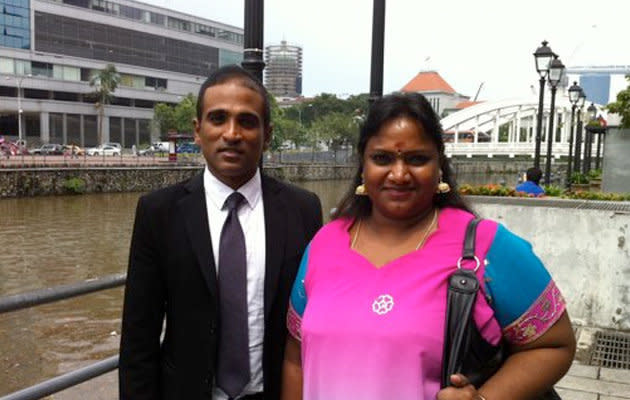Hougang by-election case to proceed
By Andrew Loh
The Court of Appeal (CA) has allowed the Attorney General's Chambers (AGC) to withdraw its appeal against the application by Hougang resident Vellama Marie Muthu seeking the Court to declare that the Prime Minister does not have "unfettered discretion" in deciding whether and when to call by-elections.
The High Court will now hear the case on a date to be decided.
In a hearing that lasted half an hour on Wednesday morning, senior counsel David Chong, acting for the AGC, said the withdrawal was because the AGC felt there is no substratum in the case brought by Vellama now since the Prime Minister has called a by-election in the Hougang constituency.
In short, he argued that there is no case to be heard and thus the AGC is withdrawing its appeal against Justice Pillai's decision in March for the case to be heard in open court.
The AGC's appeal was also objected to by M Ravi, lawyer for Vellama, who had filed an application to strike out the AGC's appeal. M Ravi said the AGC's submission of its appeal contravened the rules of court which required the AGC to seek leave from Justice Pillai. The AGC had not done so before making the appeal to the CA.
The hearing at the CA presided by Chief Justice (CJ) Chan Sek Keong, and Justices Andrew Phang and VK Rajah, lasted for about an hour. After the CA allowed the AGC's appeal to be withdrawn, the hearing turned to the issue of costs which Mdm Vellama, through her lawyer M Ravi, had sought from the AGC.
Chong objected to the claim for costs, citing M Ravi's earlier submissions that Mdm Vellama would not be seeking costs even if the AGC's appeal was dismissed.
M Ravi told the CA that his client's position has changed and that it is necessary for the Court to protect lay litigants from such potentially crippling costs, and that his application for costs is based on the principle of "protective costs order", to protect lay litigants from being penalized in costs for bringing constitutional actions against the state which is of public interest. Commonwealth countries in south Africa, india have recognized this, says M Ravi.
In other words, ordinary people must not be punished for or prevented from bringing genuine cases to the Court on fear of being made to pay exorbitant costs.
"When they filed the appeal, they said there is no merit (to our case)," M Ravi, referring to the AGC, told the court. "When they withdrew the appeal, they also said there is no merit."
The Chief Justice finally suggested a solution to the matter: that Mdm Vellama does not ask for costs in this appeal case if the AGC gave an undertaking that it would not seek costs against Vellama in the hearing in the substantive case (ie, the hearing into the actual case brought by Vellama on the PM's discretionary powers).
"We will not be seeking costs there if the AG is not seeking costs," M Ravi told reporters after the hearing. "So it's fair and square… It will be all fair, in line with our generous offer not to ask for costs, if the AG doesn't ask for costs. [This] is a matter of public interests."
The matter will now be for the two sides to agree to, although M Ravi told the court that his client is agreeable to it.
At one point in the hearing on Wednesday, M Ravi objected to CJ Chan's remarks that there is "no substratum" to the substantive case. M Ravi said the case is yet to be heard and that it is not for the CJ or the CA to say whether the case has merit. M Ravi also told the CA that his client is proceeding with the substantive application.
The case will now go to the High Court with Justice Philip Pillai, who had granted leave to Vellama for her case to be heard.
While the issue of the Hougang by-election itself may be moot, since the PM has called the by-election in the ward, and indeed Nomination Day was on the same day as the hearing on Wednesday, the wider issue of whether the PM has "unfettered discretion" when it comes to calling by-elections is still a matter to be decided.
"We are happy that the by-election has been called timeously, within the 3-months' time frame that we asked for," M Ravi said, referring to the Hougang by-election.
However, he explained that the two other fundamental issues, which Justice Pillai himself recognises, are yet to be decided, namely: whether the PM has powers to decide when to call by-elections and if he can decide whether he should call by-elections at all.
These were two of the issues raised in Vellama's application, which she brought before the court after PM Lee Hsien Loong said in March that he would consider carefully "whether and when to hold a by-election in Hougang."
"This application was triggered by a genuine concern that the Prime Minister took the view that he was entitled to decide whether to hold a by-election," M Ravi had said in his earlier arguments.
Andrew helms publichouse.sg as Editor-in-Chief. His writings have been reproduced in other publications, including the Australian Housing Journal in 2010. He was nominated by Yahoo! Singapore as one of Singapore's most influential media persons in 2011.


